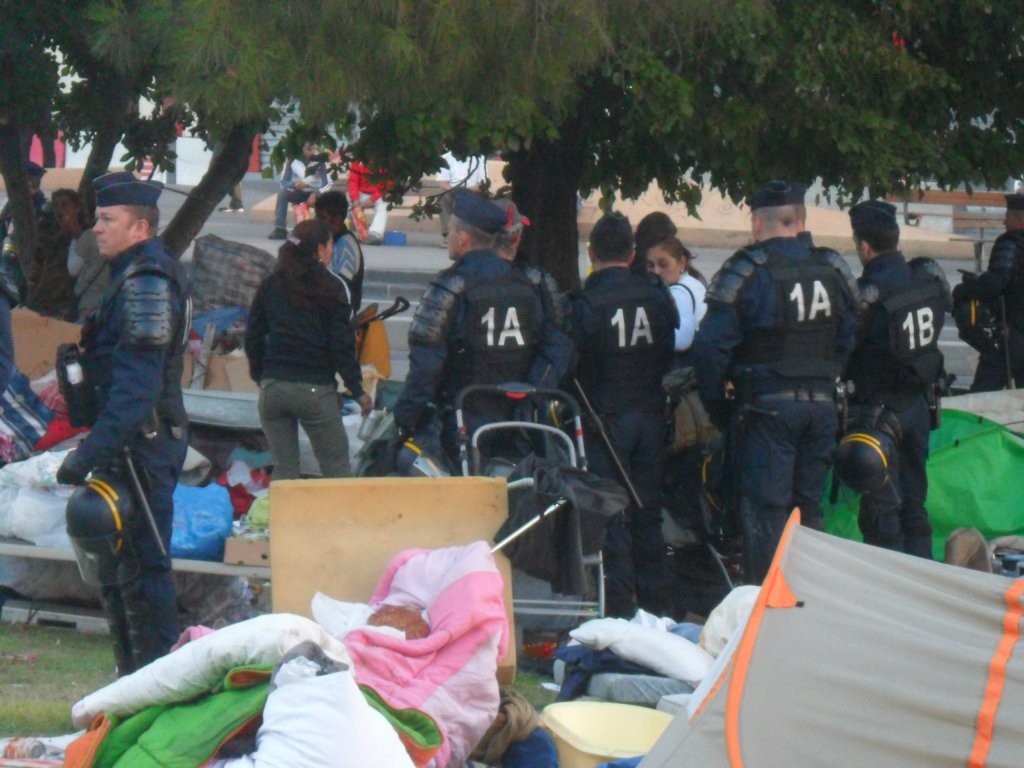French Traveller shot and killed by police: can Macron “turn the page” on France’s shame?
05 May 2017
The killing of French Traveller Angelo Garand by police on 30 March was not widely reported. It attracted none of the international media coverage and mass outrage that followed the killing of 56-year-old Chinese father-of-five Liu Shaoyo, shot dead by police in Paris's 19th arrondissement (district) just four days earlier, or the brutal truncheon anal rape by police of the 22-year-old black man known as Theo in February.
 On 22 April, some 200 people protested in front of the Palace of Justice in Blois to demand an inquiry into the circumstances that led to the death of Garand after being shot by police at his father’s house in Seur (Loir-et-Cher) on 30 March. The police raided the Traveller’s family home after Garand had failed to return from temporary release from prison in Vivonne where he was serving a two-year sentence for burglary.
On 22 April, some 200 people protested in front of the Palace of Justice in Blois to demand an inquiry into the circumstances that led to the death of Garand after being shot by police at his father’s house in Seur (Loir-et-Cher) on 30 March. The police raided the Traveller’s family home after Garand had failed to return from temporary release from prison in Vivonne where he was serving a two-year sentence for burglary.
The state prosecutor asserted that the GIGN (Groupe d'intervention de la Gendarmerie nationale) lethal response was justified, because Garand posed a danger to the police and resisted arrest. Garand’s sisters repudiated this assertion and stated "Angelo would never have thrown himself on three members of the GIGN. He may not have been an angel, but he was not suicidal."
This shooting recalled memories of the killing of another French Traveller, 22-year-old Luigi Duquenet, shot dead in 2010 by a gendarme after allegedly driving through a police checkpoint. The violent protests that followed this killing provided President Nicolas Sarkozy with the pretext to move against Romanian and Bulgarian Roma in France. Sarkozy called an emergency ministerial meeting at which it was decided that some 300 illegal camps and squats would be dismantled within three months.
The consequences of the “Sarkozy approach” to Roma exclusion would be far-reaching. This approach, which involved dawn raids and demolition of Roma camps, followed by swift and not so ‘voluntary returns’ to Romania and Bulgaria, attracted much criticism from home and abroad, with well-founded accusations of mass ethnic profiling.
In a furious row between France and the EU, Justice Commissioner Viviane Reding went so far as to draw analogies with the Second World War and described the deportations as a "disgrace". One member of Sarkozy's own UMP party, Jean-Pierre Grand, compared police round-ups of the Roma in camps to the large-scale arrests, known in French as "rafles", of French Jews and Gypsies during the Second World War.
During the presidential election campaign in the Spring of 2012, François Hollande promised to end the crackdown on the Roma and pledged to find a humanitarian solution. However, the promises that France would create a “forward-looking” policy for the Roma people, which would “set an example for the whole of Europe” never materialized.
Instead the Socialists just delivered more of the same. In 2013, then interior minister, Manuel Valls declared "The majority of Roma should be delivered back to the borders. We are not here to welcome these people.” He said that Romani lifestyles were "clearly in confrontation" with French ways of life. According to Valls, “Roma could never be integrated.”
What we got from the left was the deliberate infliction of hardship upon Roma through forced evictions and deportations, with the very young, the very old, the ill and the handicapped, cast out onto the streets often in the depths of winter, with nowhere to go. Quickly consumed with the desire for a populist fix, Valls became blinded to the obvious fact that social exclusion is costly and counter-productive. This approach characterized by harsh rhetoric and mass evictions became the ‘new normal’, and with it racist anti-Roma prejudice became the new mainstream.
The police killing of Traveller Angelo Garand serves as a tragic reminder of how little has changed. Emanuel Macron is just days away from vanquishing the racist Le Pen in this weekend’s presidential election. He has promised to “turn the page of France’s political life”, and pledged to smash “the system that failed to sort the problems of the country for more than 30 years.” Macron has promised renewal, and affirmed his commitment to upholding European values – when it comes to Roma inclusion will he “turn the page” and break with the coercive habits of the establishment right and left, or will we just get more of the same? Now could be the time for Macron to make a difference and get France back in line with European values to promote Roma inclusion.




